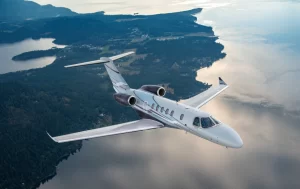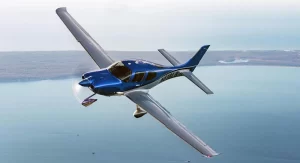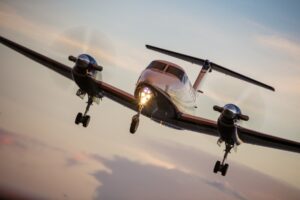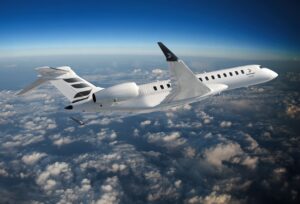Introduction Business aviation is a highly specialized segment where every detail can make a difference in choosing the ideal aircraft to meet performance, comfort, and efficiency needs. In this article, we will thoroughly analyze two aircraft that stand out in this scenario: the TBM 850 and the Piper Meridian. With an exciting journalistic approach, we will explore the history, technical specifications, operational costs, avionics, interior, and expert pilot opinions on these aircraft, providing a clear and objective view for potential buyers.
Aircraft History
The TBM 850, produced by Daher-Socata, is an evolution of the TBM 700 and was launched in 2006. It quickly gained prominence for combining the efficiency of a turboprop with the speed and performance close to that of a light jet. The Piper Meridian, introduced by Piper Aircraft in 2000, brought a new level of accessibility to the pressurized turboprop market, offering an entry-level option with solid performance and competitive operational costs.
Technical Specifications
TBM 850:

- Cruise Speed: 320 KTAS
- Range: 1,585 NM
- Fuel Capacity: 2,826 lbs
- Maximum Takeoff Weight: 7,394 lbs
- Engine: Pratt & Whitney PT6A-66D
Piper Meridian:
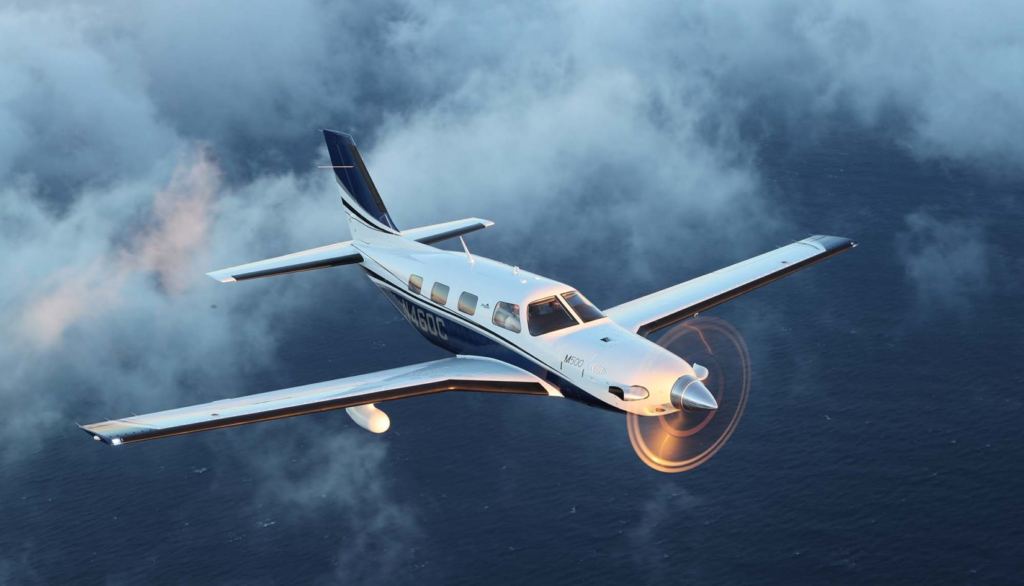
- Cruise Speed: 260 KTAS
- Range: 1,000 NM
- Fuel Capacity: 1,580 lbs
- Maximum Takeoff Weight: 5,092 lbs
- Engine: Pratt & Whitney PT6A-42A
Operational Cost
The TBM 850 presents higher operational costs due to its superior performance and greater fuel capacity, which translates into longer flight autonomy. The Piper Meridian, on the other hand, offers more economical operation, making it ideal for short to medium-distance flights where cost efficiency is crucial.
Factory-Equipped Avionics
The TBM 850 comes equipped with the Garmin G1000 system, one of the most advanced on the market, offering a full range of navigation, communication, and flight system monitoring functionalities. The Piper Meridian is also equipped with the Garmin G1000, but in a slightly simplified configuration, reflecting the price difference and market segment.
Pilot Opinions
Pilots operating the TBM 850 praise its speed and ability to cover long distances quickly, comparing it favorably to light jets. However, the Piper Meridian is often preferred by those who value simpler and more economical operation, with less complexity in managing onboard systems.
Interior
The TBM 850 offers a luxurious interior, with space for up to six passengers in a comfortable layout, ideal for long-distance flights. The Piper Meridian is slightly more compact, accommodating five passengers in a cabin that, although smaller, is well-equipped and offers a pleasant flight experience for shorter trips.
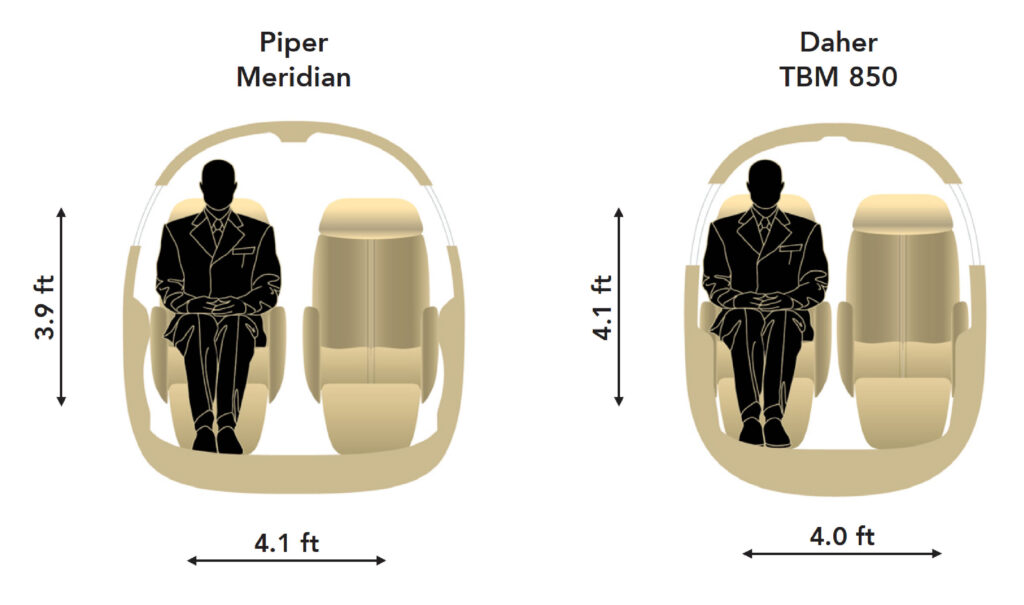
Competitor Comparison
| Characteristic | TBM 850 | Piper Meridian | Beechcraft King Air C90GTx | Pilatus PC-12 NGX |
|---|---|---|---|---|
| Cruise Speed | 320 KTAS | 260 KTAS | 270 KTAS | 290 KTAS |
| Range | 1,585 NM | 1,000 NM | 1,260 NM | 1,800 NM |
| Approximate Price | $3.5 million | $2.3 million | $3.8 million | $4.8 million |
Comparison Chart
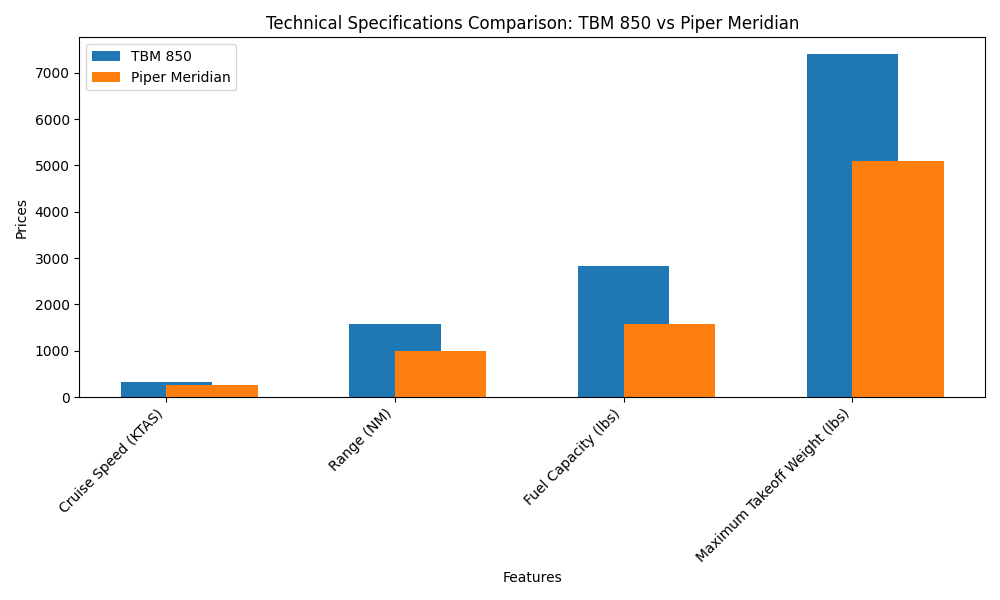
Conclusion
Both the TBM 850 and the Piper Meridian are excellent options for business aviation, each with its advantages. The TBM 850 is ideal for those seeking superior performance and willing to pay a premium for it. On the other hand, the Piper Meridian is the perfect choice for those looking for economical and efficient operation without sacrificing comfort and technology. In the end, the choice between these two models will depend on the buyer’s needs and priorities.
CTA: Interested in acquiring the TBM 850 or Piper Meridian? Contact Goal Aircraft and find out how we can help you find the perfect aircraft for your needs.
Research Sources:

